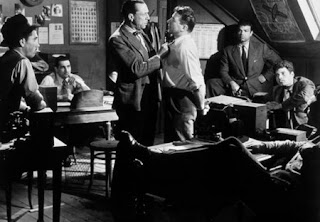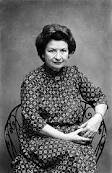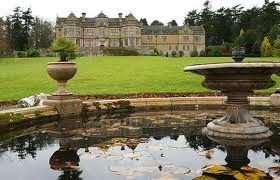Strange times
Go back 30 years, go into any public library in the UK, and you would have seen shelf upon shelf by one of the most popular writers of the day - Dennis Wheatley. Wheatley is now almost forgotten. Many of his books were out of print for many years, although I can see looking at Amazon that last year many found their way onto Kindle. In his day though, he was one of the most popular authors selling an estimated 35 million books.
Through the 60s and early 70s Wheatley was way at the top of popular British authors. Most of his books were thrillers, many with historical settings. Usually his research was pretty good, and his popularity was partly down to exotic or unusual settings, decent research, and a journalistic style that, if not as good as Frederick Forsyth, would be what would make Forsyth popular a few years later.
A small chunk of Wheatley's books, but his most well-known, were those with "Black magic" settings. Wheatley drew heavily on the life and work of Aleister Crowley when conjuring up demented Satanists with a lust for world power, an ordinary man (or woman) at the mercy of foul fiends, and swashbuckling heroes, who might be from the twentieth century, but could quite easily have graced the pages of Dumas. A couple of decent British horror films most notably The devil rides out were adapted from these.
The Satanist was one of his best known books. Written in 1960, it hasn't aged well, although the basic adventure story element still compels. What I did find hugely interesting about it was the way in which society of the day was portrayed. I believe that popular fiction often reflects the society that brought it into being rather better than literary fiction. After all, it's catering to the tastes of a mass market, this is what your average man (or woman) in the street is going to want to read. So what does The Satanist say about Britain on the cusp of the '60s? And what's it about?
The basic storyline is very simple. Teddy Morden is murdered while working undercover for MI5. Ostensibly investigating Communist infiltration into the British Labour movement, he also seems to have become involved with a Satanic coven in London. His widow, Mary, determined to avenge Teddy's murder vows to hunt down his killers, meanwhile a British rocket scientist is being persuaded in a most unorthodox manner to give military secrets to the Soviets....
Very much of its time, there are enough Reds under the beds of the establishment to even keep Senator Joe McCarthy happy. In this it fits nicely into the genre of Cold War conspiracy inspired films and books which also include works such as The Manchurian Candidate and Invasion of the Bodysnatchers. Racism is horrid, blatant, stupid and unmistakeable while women are patronised, but turn out to be intelligent, and capable of coping without men (even though the men would like to believe this isn't true).
It shows a country that is struggling with change. A country whose establishment would prefer to stay in its clubland sipping whiskies and sodas, and dining out every night, when they're not dancing that is. There's an extraordinary amount of food and drink quaffed in this novel, and dancing is mentioned so much that I began to wonder if it wasn't a euphemism. (No, it wasn't - a gentleman would never think of anything like that, although the moral codes, as far as women are concerned remain as confusing as ever). Against this though you can feel the codes cracking - good characters are flawed, bad characters have redeeming features, that which appears to be good isn't necessarily so, and so on.
For all that this is a product of its time, and a very different time it is too; there are odd moments when you realise that it isn't as different as you might like to believe. It is probably one of the earliest novels to feature a mad scientist with a yen for world domination stealing a nuclear warhead. Written around a year after Peter Bryant's Red Alert (the film that would inspire Dr. Strangelove), the underlying premise of The Satanist has much in common with current preoccupations around a possible doomsday scenario involving terrorists and nuclear weapons.
The moment I found the most troubling was a throwaway comment after the Satanic coven had been rounded up. Replying to a comment that there will be a scandal as a number of the members of the coven were rich and famous, a senior policeman remarks "I've a feeling, though, that the Home Office may decide to play down the Black Magic side of it, because there are names involved that might shake the public's confidence in a variety of national interests." Leaving Black Magic out of it, Britain has been embroiled for the last few years in a series of historical child abuse allegations; many of them featuring famous faces from the '60s and '70s. I think everyone has been shocked by it. Children of the '60s and '70s have probably been especially shocked to discover the truth behind some of the familiar faces of their childhood. What has been most shocking has been the revelation that the abuse was reported and not believed; after reading The Satanist I can see that this mindset is a product of the age. An age that was terrified of what it perceived as the authoritarianism of Communism, but fiercely determined to bolster its own establishment, and the institutions that fed into it as a bulwark against the Communist threat.
It's not a good book, you're not going to be reading this expecting a Booker Prize Winner, but if you want to know what the people of 1960s Britain (or at least a small section of them) were like, and what the politics and social mores of the period were, this isn't a bad place to start. It's a country that is recognisable but in many ways very different. If nothing else it's going to make you feel a lot more positive about living in the twenty-first century.
Through the 60s and early 70s Wheatley was way at the top of popular British authors. Most of his books were thrillers, many with historical settings. Usually his research was pretty good, and his popularity was partly down to exotic or unusual settings, decent research, and a journalistic style that, if not as good as Frederick Forsyth, would be what would make Forsyth popular a few years later.
A small chunk of Wheatley's books, but his most well-known, were those with "Black magic" settings. Wheatley drew heavily on the life and work of Aleister Crowley when conjuring up demented Satanists with a lust for world power, an ordinary man (or woman) at the mercy of foul fiends, and swashbuckling heroes, who might be from the twentieth century, but could quite easily have graced the pages of Dumas. A couple of decent British horror films most notably The devil rides out were adapted from these.
The Satanist was one of his best known books. Written in 1960, it hasn't aged well, although the basic adventure story element still compels. What I did find hugely interesting about it was the way in which society of the day was portrayed. I believe that popular fiction often reflects the society that brought it into being rather better than literary fiction. After all, it's catering to the tastes of a mass market, this is what your average man (or woman) in the street is going to want to read. So what does The Satanist say about Britain on the cusp of the '60s? And what's it about?
The basic storyline is very simple. Teddy Morden is murdered while working undercover for MI5. Ostensibly investigating Communist infiltration into the British Labour movement, he also seems to have become involved with a Satanic coven in London. His widow, Mary, determined to avenge Teddy's murder vows to hunt down his killers, meanwhile a British rocket scientist is being persuaded in a most unorthodox manner to give military secrets to the Soviets....
Very much of its time, there are enough Reds under the beds of the establishment to even keep Senator Joe McCarthy happy. In this it fits nicely into the genre of Cold War conspiracy inspired films and books which also include works such as The Manchurian Candidate and Invasion of the Bodysnatchers. Racism is horrid, blatant, stupid and unmistakeable while women are patronised, but turn out to be intelligent, and capable of coping without men (even though the men would like to believe this isn't true).
It shows a country that is struggling with change. A country whose establishment would prefer to stay in its clubland sipping whiskies and sodas, and dining out every night, when they're not dancing that is. There's an extraordinary amount of food and drink quaffed in this novel, and dancing is mentioned so much that I began to wonder if it wasn't a euphemism. (No, it wasn't - a gentleman would never think of anything like that, although the moral codes, as far as women are concerned remain as confusing as ever). Against this though you can feel the codes cracking - good characters are flawed, bad characters have redeeming features, that which appears to be good isn't necessarily so, and so on.
For all that this is a product of its time, and a very different time it is too; there are odd moments when you realise that it isn't as different as you might like to believe. It is probably one of the earliest novels to feature a mad scientist with a yen for world domination stealing a nuclear warhead. Written around a year after Peter Bryant's Red Alert (the film that would inspire Dr. Strangelove), the underlying premise of The Satanist has much in common with current preoccupations around a possible doomsday scenario involving terrorists and nuclear weapons.
The moment I found the most troubling was a throwaway comment after the Satanic coven had been rounded up. Replying to a comment that there will be a scandal as a number of the members of the coven were rich and famous, a senior policeman remarks "I've a feeling, though, that the Home Office may decide to play down the Black Magic side of it, because there are names involved that might shake the public's confidence in a variety of national interests." Leaving Black Magic out of it, Britain has been embroiled for the last few years in a series of historical child abuse allegations; many of them featuring famous faces from the '60s and '70s. I think everyone has been shocked by it. Children of the '60s and '70s have probably been especially shocked to discover the truth behind some of the familiar faces of their childhood. What has been most shocking has been the revelation that the abuse was reported and not believed; after reading The Satanist I can see that this mindset is a product of the age. An age that was terrified of what it perceived as the authoritarianism of Communism, but fiercely determined to bolster its own establishment, and the institutions that fed into it as a bulwark against the Communist threat.
It's not a good book, you're not going to be reading this expecting a Booker Prize Winner, but if you want to know what the people of 1960s Britain (or at least a small section of them) were like, and what the politics and social mores of the period were, this isn't a bad place to start. It's a country that is recognisable but in many ways very different. If nothing else it's going to make you feel a lot more positive about living in the twenty-first century.










Comments